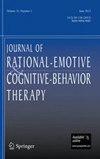A Review of the Literature on the Concept and Content of Supervision of REBT Theory
IF 1.4
4区 心理学
Q3 PSYCHOLOGY, CLINICAL
Journal of Rational-Emotive and Cognitive-Behavior Therapy
Pub Date : 2022-02-28
DOI:10.54382/krecbt.2.1.13
引用次数: 0
Abstract
In REBT, it is very important to provide education, training, and supervision so that supervisee can lead the counseling process smoothly. According to this necessity, in this study, the concept and content of supervision based on REBT theory was studied by the method of literature review. REBT supervision is a psychotherapy technique-based supervision which can be seen that it is performed in relation to therapist training. Supervision of REBT teaches general clinical and counseling techniques as well as specific techniques that perform allied modes of REBT and CBT Supervision. In order to help understand, the characteristics of REBT theory supervision and the characteristics shared with CBT supervision were identified and organized. The mixed model used in REBT supervision is derived from REBT theory and focuses on utilizing and facilitating distinct educational models using REBT's own techniques as training models. Therefore, early in Supervision, it is important to educate novice supervisee until they become familiar with the ABC model as for the treatment technique, in which the insight is regarded as a therapeutic achievement as a result. In REBT supervision, case conceptualization, multi-method approach, therapeutic relationship, importance of unconditional acceptance, supervision using audio tape and video tape, and evaluation are treated as important as CBT supervision.REBT理论监督概念与内容的文献综述
在REBT中,提供教育、培训和监督是非常重要的,以便被监督者能够顺利地领导咨询过程。基于这一必要性,本研究采用文献综述的方法,对基于REBT理论的监督概念和内容进行了研究。REBT监督是一种基于心理治疗技术的监督,可以看出它是与治疗师培训有关的。REBT的监督教授一般的临床和咨询技术,以及执行REBT和CBT监督联合模式的具体技术。为了帮助理解,本文对REBT理论监督的特点以及与CBT监督共有的特点进行了识别和整理。在REBT监督中使用的混合模式源于REBT理论,侧重于利用和促进不同的教育模式,以REBT自己的技术作为培训模式。因此,在早期的监督中,重要的是教育新手被监管者,直到他们熟悉ABC模型的治疗技术,在这种模型中,洞察力被视为一种治疗成果。在CBT监督中,病例概念化、多方法方法、治疗关系、无条件接受的重要性、录音录像监督和评价与CBT监督同等重要。
本文章由计算机程序翻译,如有差异,请以英文原文为准。
求助全文
约1分钟内获得全文
求助全文
来源期刊

Journal of Rational-Emotive and Cognitive-Behavior Therapy
PSYCHOLOGY, CLINICAL-
CiteScore
3.50
自引率
18.80%
发文量
49
期刊介绍:
The Journal of Rational-Emotive and Cognitive Behavior Therapy is an international journal that publishes scholarly original papers concerning Rational Emotive Behavior Therapy (REBT), Cognitive Behavior Therapy (CBT), behavior therapy, cognitive-behavioral hypnosis, and hypnotherapy, clinical and counseling psychology, psychiatry, mental health counseling, and allied areas of science and practice. The journal encourages scholarly debate amongst professionals involved in practice, theory, research, and training in all areas of scholarship relevant to REBT and CBT. The Journal is particularly interested in articles that define clinical practice and research and theoretical articles that have direct clinical applications. The Journal seeks theoretical discussions and literature reviews on the cognitive bases of the development and alleviation of emotional, behavioral, interpersonal, personality, and addictive disorders. We consider submissions on the applications of REBT and CBT to new areas of practice and client populations. The Journal considers the term Cognitive Behavior Therapy to represent a generic, overriding category or school of psychotherapy approaches that includes many different theories and techniques. The journals encourages research that clearly identifies the specific hypothetical constructs and techniques being measured, tested, and discussed, and the comparison of the relative influence of different cognitive processes, constructs, and techniques on emotional and behavioral disturbance. The Journal provides a timely introduction to unexplored avenues on the cutting edge of REBT and CBT research, theory, and practice.The Journal publishes:discussions of the philosophical foundations of psychotherapiestheory-buildingtheoretical articlesoriginal outcome research articlesbrief research reportsoriginal research on the support of theoretical models development of scales to assess cognitive and affective constructsresearch reviewsclinical practice reviewsempirically-based case studiesdescriptions of innovative therapeutic techniques and proceduresadvances in clinical trainingliterature reviews book reviewsUnder the guidance of an expanded, international editorial board consisting of acknowledged leaders in the field, the journal disseminates current, valuable information to researchers and practitioners in psychology, psychotherapy, psychiatry, mental health counseling, social work, education, and related fields.Manuscripts usually are less than 35 pages, double-spaced, and using 11 or 12-point font. If the authors need more space to communicate their research or ideas, they should write to the editors to discuss this issue and provide a rationale why more than the commended number of pages is needed.
 求助内容:
求助内容: 应助结果提醒方式:
应助结果提醒方式:


